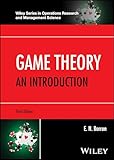Game theory [3rd ed.] : an introduction
Series: Wiley series in operations research and management science | / edited by James J. CochranPublication details: Wiley 2024 HobokenEdition: 3rd edDescription: xxiv, 552pISBN:- 9781394169115
- 519.3 B278g3
| Item type | Current library | Collection | Call number | Status | Date due | Barcode | Item holds | |
|---|---|---|---|---|---|---|---|---|
 Books
Books
|
PK Kelkar Library, IIT Kanpur | On Display | 519.3 B278g3 (Browse shelf(Opens below)) | Available | A186959 |
Authoritative and quantitative approach to modern game theory with applications from areas including economics, political science, computer science, and engineering
Game Theory acknowledges the role of mathematics in making logical and advantageous decisions in adversarial situations and provides a balanced treatment of the subject that is both conceptual and applied. This newly updated and revised Third Edition streamlines the text to introduce readers to the basic theories behind games in a less technical but still mathematically rigorous way, with many new real-world examples from various fields of study, including economics, political science, military science, finance, biological science, and general game playing.
The text introduces topics like repeated games, Bayesian equilibria, signaling games, bargaining games, evolutionary stable strategies, extensive games, and network and congestion games, which will be of interest across a wide range of disciplines. Separate sections in each chapter illustrate the use of Mathematica and Gambit software to create, analyze, and implement effective decision-making models.
A companion website contains the related Mathematica and Gambit data sets and code. Solutions, hints, and methods used to solve most problems to enable self-learning are in an Appendix.
Game Theory includes detailed information on:
The von Neumann Minimax Theorem and methods for solving any 2-person zero sum matrix game.
Two-person nonzero sum games solved for a Nash Equilibrium using nonlinear programming software or a calculus method. Nash Equilibria and Correlated Equilibria. Repeated games and punishment strategies to enforce cooperation
Games in Extensive Form for solving Bayesian and perfect information games using Gambit.
N-Person nonzero sum games, games with a continuum of strategies and many models in economics applications, duels, auctions, of Nash Equilibria, and the Stable Matching problem
Coalitions and characteristic functions of cooperative games, an exact nucleolus for three-player games, bargaining
Game theory in evolutionary processes and population games
A trusted and proven guide for students of mathematics, engineering, and economics, the Third Edition of Game Theory is also an excellent resource for researchers and practitioners in economics, finance, engineering, operations research, statistics, and computer science.
There are no comments on this title.

